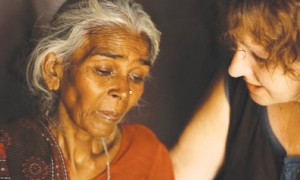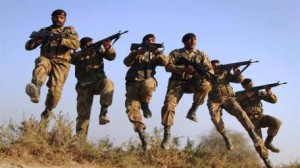March, 08 2015
From dawn.com
SONIA FALEIRO
 Leslee Edwin meets the mother of convicted rapist Mukesh Sngh.
Leslee Edwin meets the mother of convicted rapist Mukesh Sngh.
INDIA’S Daughter is director Leslee Udwin’s stirring documentation of a crime that triggered what she has described as “an Arab Spring for gender equality” in India.
The December 2012 Delhi bus gang rape resulted in the death of 23-year-old medical student Jyoti Singh at the hands of six men. The men threw Jyoti and her male friend out of the bus before gleefully divvying up the pair’s belongings. One rapist got a pair of shoes, another scored a jacket. There was, however, an item that Jyoti had left behind which the men didn’t want. So they wrapped the innards they had wrenched out of her in their frenzy of violence in a piece of cloth, and pitched it through the window. “They had no fear,” Mukesh Singh, the driver of the bus and one of four men to be convicted for Jyoti’s rape and murder, tells Udwin.
The interview with Mukesh, whose death sentence is currently in appeal, is a coup for Udwin, who is the first journalist ever allowed to talk to him, or any of the men. She will likely be the last. Yesterday the authorities banned the film in India after claiming that Udwin had failed to get the requisite permissions. Shortly afterwards the parliamentary affairs minister M Venkaiah Naidu described the film as “an international conspiracy”.
Naidu’s allegation is bewildering, given that the film reveals little that is new either about the crime, or the mindset of the man convicted of it.
Journalists have reported on the rape in detail. And surely it comes as no surprise that someone who participated in a gang-rape and is now on death row will place blame just about anywhere it might stick in the hope of a reprieve — the grinding poverty that he was born into, the overbearing nature of his older brother, who is believed to have masterminded the assault, even his victim.
A whining Mukesh comes off as genuinely unconvinced that he should be in jail. “She should just be silent and allow the rape,” says Mukesh, implying that if Jyoti had only done the right thing and let the men take from her what was theirs — her body — she would still be alive today.
In fact audiences, in India at least, are unlikely to flinch at anything Udwin has to show them. If she thinks that she is holding up a mirror, she should know that Indians have been looking into it for some time now and are as eager for reform as those outside India demanding it on their behalf.
Even the statements of the two lawyers for the men, in which they describe women in terms as disparate as diamonds, food, and flowers — objects all, of course — before finally admitting that “in our culture there is no place for women” will sound familiar.
But it is the dismaying familiarity of the views expressed by Mukesh and his lawyers — which are now mainstream in India, echoed by everyone from politicians to high school students — that makes this essential viewing. Some will argue that the unapologetic misogyny revealed in these interviews is a skewed representation of the Indian male mindset. But it is, in fact, widespread.
Mukesh’s interview also confirms that Indian jails restrain; they do not rehabilitate. It is obvious, given the views he expresses to Udwin, that were he to be released today he would walk the streets of Delhi still convinced of the lopsided inevitability of relationships between men and women: what men want, women must promptly give, even at the pain of death.
Udwin has opted for a tight focus, but some viewers may wish that she had embraced a broader view of the rape crisis in India. The country’s history of anti-rape agitation, for example.
The protests that followed the death of Jyoti may have been the largest against rape, but they were certainly not the first. Earlier high-profile crimes such as the 1972 Mathura custodial rape case also led to legal reform, and laid the groundwork for the development of the protest constituency that filled Delhi’s political corridor from Rashtrapati Bhawan to India Gate that December, in what ultimately turned into a war zone of tear gas, lathi strikes, and police violence.
But Udwin, like any good field reporter, doggedly pursues this one case from start to present, unable to tear herself away even for a minute. Her intimate focus allows for a more affecting narrative.
Jyoti’s parents emerge as superheroes, radiating courage and strength. Her father Badri Singh, then an airport loader, comes across as exactly the sort of modern, forward-thinking, male feminist that India would be so lucky to have many millions more of. And her mother, Asha Singh, who says of Jyoti’s birth “we celebrated like she was a boy”, was surely the propeller that allowed her daughter’s soaring ambitions to take flight.
Udwin skilfully contrasts the light in Jyoti’s young life with the darkness that engulfed the lives of her rapists.
The Singhs were poor, but they cared for their children fiercely. Jyoti, their only daughter, grew up well-adjusted and focused, but also deeply empathetic. One of her friend’s recalls that after the police picked up a street urchin for snatching her purse, Jyoti, rather than berating the boy, took him aside and asked him what made him do it. Because I want what you have, he said — shoes, jeans, a hamburger. Jyoti, recalled her friend, promptly took the boy shopping and bought him everything on his wish list. Her only stipulation was that he not steal again.
The word “happy” repeatedly comes up in reference to Jyoti. She was happy, said Asha. She had only six months of her internship left, recalled Badri. “Happiness was a few steps ahead.”
In contrast, the six men who would take Jyoti’s life appear never to have encountered happiness. The juvenile left his home in a village in the northern state of Uttar Pradesh when he was just 11 years old and didn’t return. His mother thought him dead. The others were familiar with poverty and violence. In turn, they were violent towards others. “There is nothing good about him,” Mukesh says of one his co-conspirators. Of another he admits: “He was capable of anything.”
A psychiatrist in Delhi’s Tihar Jail, where Mukesh is lodged, tells Udwin that he knows of rapists who have committed as many as 200 rapes before they are ever caught. Two hundred rapes that they remember, that is.
Given Mukesh’s own statements it isn’t a stretch to say that had the men got away with raping and killing Jyoti, they would have raped and killed again. Or, that neither Mukesh’s mindset nor even the manner of the rape, during which an iron rod was inserted into Jyoti, was, as the court declared in its judgement, truly “the rarest of the rare”. As recently as February this year, a woman was gang-raped by nine men in Rohtak, Haryana for over three hours. The men violated her with bricks and asbestos sheets. Sticks, stones and condoms were found stuffed in her private parts .
India’s Daughter doesn’t malign India, but Naidu’s statement about a “conspiracy” does demonstrate, with an acute lack of self-awareness, what lies at the heart of the nation’s rape crisis.
Naidu isn’t implying that rape is shameful; but that talking about rape is shameful because it draws attention to the fact that it happens at all. This fear is exactly what prevents rape victims from filing police complaints, and, as a result, emboldens rapists to strike again and again. In fact, Udwin has done what India’s politicians should rightfully be doing: investigating rape cases thoroughly and discussing them openly.
While eloquently expressing his love for his daughter, Badri tells Udwin: “I wish that whatever darkness there is in the world should be dispelled by this light.”
The Indian government has thwarted his wishes. By banning this documentary it has deprived the Singhs of the opportunity to share the story of their daughter widely within India. In attempting to push a conversation about rape back into the closet, it has stigmatised the subject further. It has done more damage to India’s reputation, and, far worse, the fight against rape, than any film ever could.
By arrangement with the Guardian
Published in Dawn March 7th , 2015



